#4.15.1
Explore tagged Tumblr posts
Text
I know that Cosette is an integral part of the story of Les Mis, in a way that I think is really under recognized, especially in adaptations where her characters is incredibly flattened, and that we need to talk about how she connects basically the entire book.
But y'know what? I think we don't admit enough how Jean Valjean is the protagonist. Every big, inciting incident in this book including the introduction of Cosette happens because he had a crisis. The only exception to this rule is the June Rebellion, and Hugo's language explicitly parallels the two at points.
We are now witnessing the third great crisis (the first being the Bishop and the second being Valjean forced to turn himself in, then going and finding Cosette). At the time of the second crisis, Hugo tells us that without it Valjean might have lost some of the true and pure goodness instilled in him by Myriel. And while this exact sentiment isn't stated at this point, I do think we are meant to feel that way. Especially in regards to this paragraph:
"After he had firmly established that that young man was at the bottom of this state of affairs, and that everything stemmed from him, he, Jean Valjean, the regenerated man, the man who had so labored on his soul, the man who had made so many efforts to resolve all life, all misery, and all misfortune into love' he looked within himself and saw a specter, Hatred."
What truly brings out the goodness in Valjean is when he demonstrates that true, spontaneous love that goes against his interests. Turning himself in was against his best interests. So was going to find Cosette, promising to Fantine that he would help her child. Now here is another opportunity. Hugo mocks Valjean by reminding him of all that he's supposedly accomplished in regards to love. Showing that Valjean is once more straying.
In seeing Cosette as "his" (which Marius does too in a way that is equally foolish) Valjean is losing sight both of how life works and how love works. And now he must truly face this.
37 notes
·
View notes
Text
Round 1, Matchup 197: IV.xv.1 vs V.i.20
13 notes
·
View notes
Text
I love the parallel between Valjean and the situation in Paris! We’re at another one of his crisis moments, and this time, the world around him is just as tense.
While the political upheaval must be rough for him (it means more police officers and more scrutiny of everyone, which at best makes him nervous and at worst actively endangers him), the breakdown of communication between him and Cosette is what really hurts to read about. Their communication isn’t great – Valjean is too secretive, and Cosette’s now hiding something from him, too – but they’ve generally been in tune with each other’s emotions. Now, they’re both too distressed to realize that the other is unhappy, depriving both of them of the closest thing they have to a support network. It’s not a good sign.
The description of his happiness in this new place also underscores the issues with Valjean’s taste in homes. “Contagion,” “dimly lighted,” and “stagnant oblivion” all bring to mind various awful environments. For “contagion,” it makes me think of the cholera pandemic ravaging Paris at that moment, but it also suggests that “tranquility” is a disease in itself, as it allows him to dodge the actual problem (not communicating with Cosette about his past so they can make better decisions together). “Dimly lighted” makes me think of a prison, and “stagnant oblivion” of the convent (which is, symbolically, also a prison). Overall, it implies that Valjean has fled to a prison-like environment where he feels comfortable, but where he and Cosette are both trapped. The reference to the “inseparable” emphasizes this, as it indicates his attachment to old habits and a past that is gone.
Similarly, I understand his feeling that Cosette is “his nation” and that it doesn’t matter where he is as long as they’re together, but his decisions remain unilateral, which means they neglect Cosette’s needs. Additionally, it highlights his lack of alternative sources of love. Hugo explicitly repeats here that Valjean’s only source of love in life is Cosette and that’s why he’s so attached to her, but it’s not good for either of them for him to be this dependent. 19th-century praise of the nation is uncomfortable as a modern reader, but I think the problem brought to light by this line is that Valjean has no “nation” – as in, a broader society that supports him – and it causes him to place all of his love and all of his needs on one person.
Unfortunately for critical analysis purposes, I find Valjean’s hatred of Marius hilarious, so I must admit that I laughed at his conclusion that the beloved must be Marius.
Still, we now have yet another character heading to the barricade out of despair.
28 notes
·
View notes
Text
Finally, no one is dying, but this chapter hurts in a different way. We are back to the beginning of the day of 5 June. It feels like a Groundhog Day that we have to experience and live through as many times as there are characters. It’s Jean Valjean’s turn to endure this cursed day.
Toussaint is my only solace here. At least one reasonable, perceptive, and not curious person present in this realm of self-absorbed individuals: thanks to her, they have some basic clothing (including a national guard uniform) and are aware of insurrection in the city.
Jean Valjean has been on an emotional roller coaster. It was good that he finally felt relaxed and peaceful after moving out of the house on Rue Plumet, but the way he dreamt about leaving for London with Cosette at his side and his conviction that he possesses her are not good. It makes him so similar to Marius. They both make poor girl the centre of their existence, and while it is meant as a flattering thing, it is not. It’s a burden. She deserves better than this.
Valjean’s mood dramatically changes when he discovers traces of Cosette’s message to Marius on a blotting book. He regresses to his emotional state before he met the bishop, a state in which hatred towards mankind prevailed. He is full of self-pity, and in his thoughts, Cosette once again figures as some kind of reward for his past sufferings. Hugo delves into lengthy explanations that Valjean’s feelings for Cosette are complex, but there is nothing objectionable (meaning sexual) in them.
Concerning this phrase: “Try then the effect of taking from the lion the dog which he has in his cage!” Did anyone of you read this story at school? Apparently, it was a popular story in the nineteenth century, and many authors retold it. In elementary school, we had to read this story retold by some Russian classical author (I think it was Tolstoy). A lion in the zoo did not kill a small dog that got into his cage because it was amusing and friendly. Instead, he shared food with it (and probably there was more, but I don’t remember the details). And then the dog died. A week later, the lion died of grief. (Another traumatic story for the kids!) So, it means that Valjean (the lion) will die as soon as his little dog (Cosette) is taken from him.
After his revelation, Valjean becomes interested in the “fighting” (insurrection). But we will never learn what his initial plan was before he intercepted Marius’ letter. And he just sits and waits outside in the darkness.
21 notes
·
View notes
Text
Interesting... the French on the note reads:
"Qand je pense qu'il me faut partir en Angleterre dans une semaine ma cœur est presque —" Two errors: "Qand" should be "Quand", and cœur is masculine so it should be "mon cœur"
Translation: "When I think that I must leave for England in a week my heart is nearly —"
That specific wording of the note doesn't appear in the French text anywhere, so I wonder where it came from.
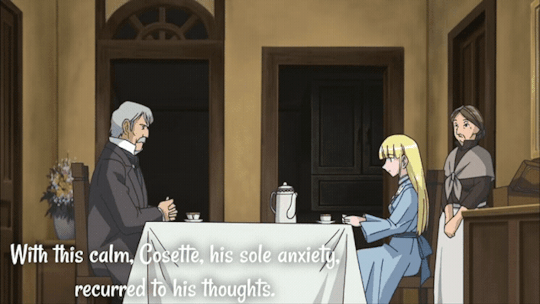
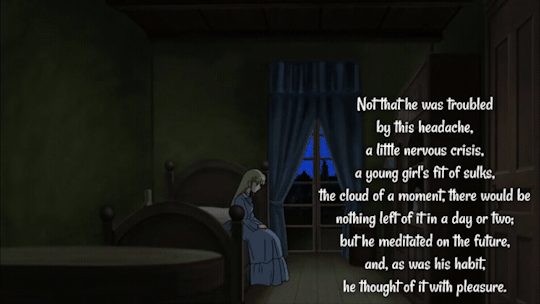
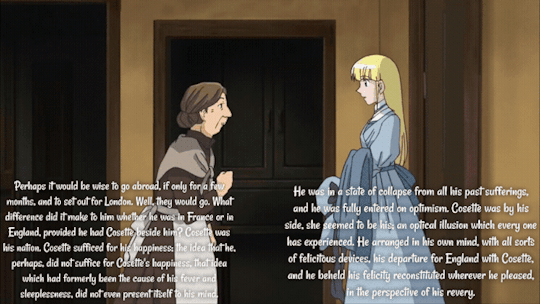

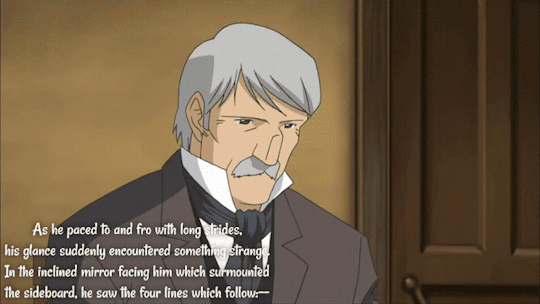
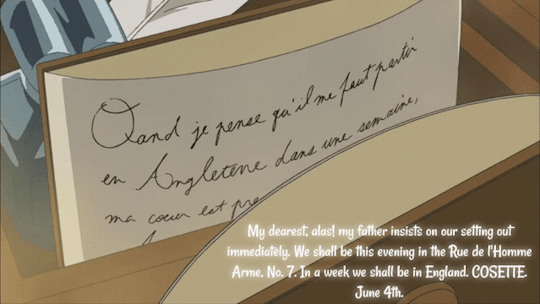

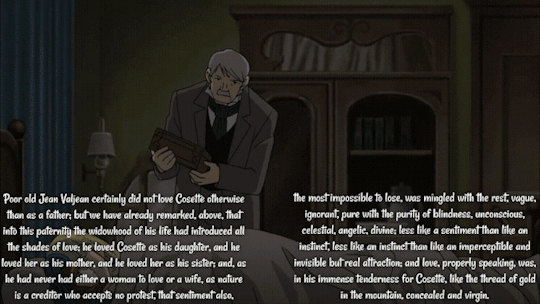

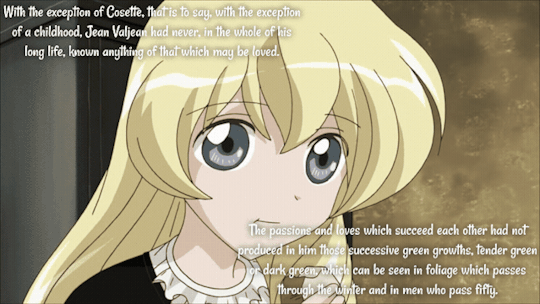
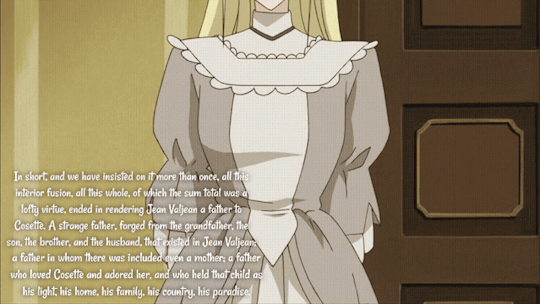
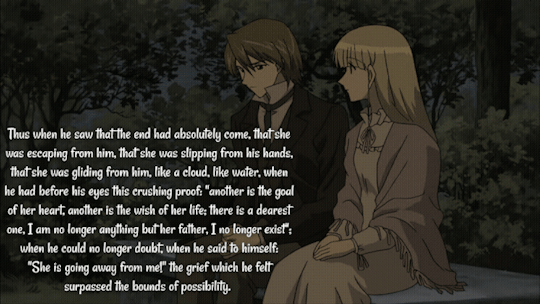
A Drinker is a Babbler. Volume 4, Book 15, Chapter 1.
Clips from <Il cuore di Cosette>.
22 notes
·
View notes
Text
LM 2.4.2
virgin becomes a parent on the 25th december. haven't i seen that somewhere before
(i'd forgotten he SPECIFICALLY MENTIONS IT WAS NINE MONTHS. valjean mpreg is real)
echoes of the night valjean stole the candlesticks, "ready to break this skull or kiss this hand", and, as stated in the text, fantine’s death. because, as hugo will tell us in the weirdest possible way in lm 4.15.1, valjean only allows himself one (1) relationship at a time and needs to transfer every single feeling from each to the next. with the bishop, he could not make his choice; with fantine, he made it too late; with cosette, he’s made it in time! which would be great, because we love valjean getting to grow as a person, except that what he’s growing into is Putting People On Pedestals. not good for valjean’s sense of self-worth (or sense of self) and also not good for the person being placed on the pedestal. religious feelings about dead bishops are okay(ish), religious feelings about your daughter are not
cosette is a warbler now, rather than a lark – pretty similar birds; she’s still the same little girl, but now she’s shed the awful reasoning for being called the lark – being frightenned and always up before the dawn. she's free to just be happy and sing (play)
12 notes
·
View notes
Text
The idea of the Olympians being some sort of elite club does appear in Diodoros of Sicily's Library of History (4.15.1): „After this, when the Giants about Pallenê chose to begin the war against the immortals, Heracles fought on the side of the gods, and slaying many of the Sons of Earth he received the highest approbation. For Zeus gave the name of “Olympian” only to those gods who had fought by his side, in order that the courageous, by being adorned by so honourable a title, might be distinguished by this designation from the coward; and of those who were born of mortal women he considered only Dionysus and Heracles worthy of this name, not only because they had Zeus for their father, but also because they had avowed the same plan of life as he and conferred great benefits upon the life of men.”
However, there is no indication here that the Olympians are specifically a group of twelve. Later on in this work (4.39.4) after his death, ascent to Olympos, adoption by Hera and marriage to Hebe, Herakles refuses to join the dodekatheon (in the previous passage it is not specified that he refused the title of Olympian) and it is explained that he does so because him being added to the group would necessitate the removal of an existing member: „They report of Heracles further that Zeus enrolled him among the twelve gods but that he would not accept this honour; for it was impossible for him thus to be enrolled unless one of the twelve gods were first cast out; hence in his eyes it would be monstrous for him to accept an honour which involved depriving another god of his honour.”
8 notes
·
View notes
Text
Matomo 4.15.1 corrections de bugs et améliorations au programme
La communauté Matomo est ravie d'annoncer la mise à jour Matomo 4.15.1. Cette version a été déployée pour résoudre une régression majeure qui s'était introduite dans la version précédente (4.15.0), ainsi que pour implémenter quelques autres améliorations mineures dans la plateforme.

Matomo 4.15.1 corrections de bugs et améliorations au programme - LaRevueGeek.com
0 notes
Text
Brick Club 4.15.1
Happy Barricade Day! Overthrow your government!

Valjean is having some concerns. “For the first time since they had lived together, Cosette’s will and Jean Valjean’s will had shown themselves distinct.” It becomes apparent that these two have not learned how to communicate with each other, they’ve just been lucky enough to have been going in the same direction until now. Valjean knows how to read Cosette’s moods in fair weather conditions, but now that he has worries, he forgets that.
This is a character flaw of Valjean’s that I really like; he’s paranoid, and when he gets paranoid, he gets selfish, his self-preservation instinct driving out most other considerations. It works really well on a character and thematic level and I enjoy watching him grapple with it.
Another excellent thing we see is Valjean struggling to see Cosette as a person, rather than a symbol, something Marius has also gone through with different result. “Into this paternity the very bereavement of his life had introduced every love.” Hugo words this awkwardly, but Valjean is completely dependent on Cosette as a source of all the love and happiness he never before had, which is an incredibly fine line to tread not even considering that he’s supposed to be a father to her and Cosette doesn’t know him as anything else. BBC Valjean is an example of what crossing this line looks like and I would attribute to the modern trend of coding overprotective, controlling behavior as romantic or otherwise loving. Being forcibly reminded that Cosette has her own agency and personhood outside of him is a realization that this dependence isn’t mutual. To Valjean, it is akin to his country, his family, his God forsaking him.
Pretty dramatic for a fairly standard life event, considering Cosette marrying wouldn’t mean her abandoning him, clearly, but it’s a major paradigm shift and Valjean is not very good at those. Or he’s losing his capacity to manage them. Ironically, Valjean and Marius, the object of his Hatred, are on nearly identical paths right now, we even get the same descriptions of anomic suicidality. And how else can a man in Paris seek his death? On Barricade Day?
#brickclub#les mis#les miserables#4.15.1#i cannot plumb the depths of this mind#marius i will tackle#valjean is beyond what i can fathom most of the time#the stuff with cosette gets kinda intense in a weird way#its so much more than an empty nest thing which is what it initially sounded like all those books ago
5 notes
·
View notes
Text
A Drinker Is A Babbler
Valjean moved himself, Cosette, and Toussaint to the Rue De L’Homme Arme. All he brought with him was the little black valise. Once they arrived at the apartment, Valjean felt more at ease. Cosette mostly stays in her room. Valjean supposes that, wherever he goes, he can be happy as long as Cosette is with him.
Then he catches sight of Cosette’s blotting-book through the mirror with the note she had written to Marius visible.
Cosette is the only person Valjean has truly loved, and now he sees that she loves another. He senses instinctively that it is Marius, even though he doesn’t know Marius’s name.
Valjean realizes that he hates Marius.
#a year of les mis#volume iv st. denis#book 15 the rue de l'homme arme#chapter 1 a drinker is a babbler#4.15.1#295/365#Les Miserables
0 notes
Text
Brickclub 4.15.1 “Blotter, Blabber”
Valjean, Cosette, and Toussaint go to the Rue de l’Homme Armé in response to Eponine’s warning. For the first time in her life, Cosette fights with Valjean.
Valjean doesn’t even notice.
He’s honestly a lot more focused on the Inseparable than he is on her: that is, the dead, embalmed version of child!Cosette he tends to prefer these days to his living, changing daughter. Inasmuch as he notices Cosette is upset, he entirely dismisses it as
a petty case of nerves, a young girl's brooding, a passing cloud, in a day or two it would be gone.
Pilf has pointed out before how one of Valjean’s last big mistakes is running from a house with a garden to one without, given the kind of growth and change and hope gardens represent in this text.
And yeah: this is Valjean digging in his heels to all the worst things he’s become in the last few years. The Rue de l’Homme Armê is described as
Jean Valjean felt a strange contagion of tranquility in that lane of the old Paris, so narrow that it was barred to carriages by a beam laid on two posts, deaf and dumb in the midst of the noisy city, twilight in broad day, and, so to speak, incapable of emotions between its two rows of tall, century-old houses that kept their silence like the patriarchs that they are. There is stagnant oblivion in this street. Jean Valjean could breathe in peace there.
It’s old, it’s lifeless, it’s boring, it’s unchanging. And, with that line about the houses being Patriarchs, we know it will side with the Father in family conflicts.
Which is literally true. Cosette had a secret power in a house with a garden. There were things there Valjean didn’t know and couldn’t control, and it was right that there were. Here, there’s a portress at the front and they live three stories up, facing the closed inner courtyard. Even if Marius knew where Cosette was, it’s not clear he’d be able to reach her.
It’s also fascinatingly horrible that the “The Street of the Armed Man” is Valjean’s happy place now. We get a mention of Valjean’s National Guard uniform in a bag, which is obviously some literal foreshadowing, but it’s also what Valjean has become: someone for whom the armed and violent forces of order are a source of comfort.
We also get this passage:
At certain moments, everything seems impossible; at others, everything appears easy; Jean Valjean was in one of those happy moments. They usually follow after the bad ones, like day after night, by that law of succession and contrast that lies at the very foundation of nature, and which superficial minds call antithesis.
Which is a pretty normal description of a mood, except for the way it echoes the literal last line of this book:
He sleeps. Although his fate was very strange, he lived. He died when he had no longer his angel. The thing came to pass simply, of itself, as the night comes when day is gone.
Valjean thinks he’s happy here, but for a while now, everything he finds comforting is a reminiscent of death. See also: the Inseparable, and also that horrifying chapter where we see the chain gang, and before they come, Cosette is watching the dawn and Valjean is looking away from the dawn and feeling contentedly dead.
Then, he sees Cosette’s blotter and everything changes for him in an instant.
During that, he compares Cosette to a dog, which: NO.
Then he heard his soul, turned terrible once more, give a stifled roar in the darkness. So go and take away from the lion the dog he has in his cage.
Dog is one of the most negative animals in this book, and Cosette has done nothing to deserve that.
Valjean comes to another of his moments of internal torment and wrestling with his conscience, and Hugo tells us this is the hardest of all, because he’s never loved anyone before. I love this passage:
Jean Valjean, in all his long life, had known nothing of those things man can love. The passions and the loves that succeed one another had not left on him those successive greens, a tender green over a somber green, that we notice on leaves that have lived through the winter, and on men who are past their forties.
Valjean is much, much older than the young people currently embroiled in turmoil and heartbreak over love, but none of his years gave him the perspective and breadth that might make him handle it better. In fact, he’s worse off--this isn’t a beginning of life love, it’s an end of life love, and he has years and years without any affection behind him that demonstrate to him that it’s either Cosette or Death now.
This is, obviously, extremely wrong; Cosette isn’t actually going to stop loving her father just because she has a boyfriend.
But both Marius and Valjean expect to have not just her love but entire ownership of her, and that’s the key problem with both of them. If Valjean was able to give up that ownership instead of thinking he has to give up Cosette-plus-living, we’d be doing a lot better! But he hasn’t loved enough people to know owning someone and loving them are different things. Unfortunately, neither has Marius.
Finally, Valjean goes out. We don’t need to be told why, because we were told with Eponine: “she went to Courfeyrac's to ask for Marius, not to give him the letter, but, a thing that every jealous and loving soul will understand, "to see."”
And the chapter ends, ominously, with “Night had fallen.”
Even for Grantaire at his lowest, night was only beginning to descend. But for Valjean, we’ve reached full night.
5 notes
·
View notes
Text
IV.xv.1 Buvard, Bavard
Blotter, Blabber: Wilbour
Blotting, Blabbing: Wraxall
A Drinker Is A Babbler: Hapgood
Blotting-Case, Blabber: Jolivet
The Treacherous Blotter: Denny
The Blotter Talks: FMA
A Blabber of a Blotter: Rose
The Tell-Tale Blotter: Donougher
7 notes
·
View notes
Text
Brickclub 4.14.7, “Gavroche a Profound Calculator of Distances,” and 4.15.1-3, “The Rue de l’Homme Armé”
It has been A Week, and don’t have a lot to add to @everyonewasabird‘s writeups of these chapters (4.14.7, 4.15.1, 4.15.2, 4.15.3), so I’m just going to put down a few extra observations and move on.
--Writing his name and his grandfather’s address in his pocketbook may be the most foresight we’ve seen Marius show at any point in this book. It feels very realistic that it only comes after he’s embarked on his suicide-by-barricade.
--After all the speculation about whether Marius would have used the second pistol on Cosette if he’d gotten the letter, I’m now not certain how he could have, logistically. If he’d met Cosette in the garden--their garden, where they were unobserved and he came the closest to feeling like he had agency--I think there was a real risk. But at the Rue de l’Homme Armé, there’s a portress, and Cosette’s windows face the back. There’s no way, logistically, for Marius to have met with her alone--and, honestly, I think his Romantic visions of destruction might have crumbled in the face of a suspicious portress.
--When Valjean first asks Toussaint where the disturbance is, he hasn’t yet gotten the letter from Gavroche. He’s only seen Cosette’s note, which doesn’t mention barricades at all since she has no idea that’s where Marius is. He heads outside, and doesn’t move past the curbstone, but we don’t know whether he’s asked about the fighting so as to avoid it, or in the spirit of self-destruction that’s already drawn Marius, Mabeuf, and Eponine to the barricade.
--4.15.1, “The Tell-Tale Blotter,” is just a greatest hits of all the book’s imagery so far. Beyond the night and dawn and animal symbolism Bird digs into, Valjean “attains the coldness of a statue,” and there’s a strong echo of the sunken road in “He recognized the precipice; it was the same as ever. Only, Jean Valjean was no longer on the edge of it, he was at the bottom. Extraordinarily and poignantly enough, he had fallen over the edge without noticing. All the light in his life had gone and there he was, thinking he could still see the sun.”
--The apartment is at Rue de l’Homme Armé, number 7--in Hugo’s numerology, adding one more brings utter ruin. But we’re reminded of the number just before Gavroche appears--though he is bearing Marius’s letter, so perhaps he’s no more bound by the number 8 than by anything else in the text.
4 notes
·
View notes
Text
The grand revelation is finally unveiled! M. Madeleine is none other than Jean Valjean. Who could have anticipated that twist? That explains a lot of things!
Whenever Hugo allows us a glimpse behind Valjean's self-constructed persona, a tempest like this one unfolds. Though the previous tempest occurred not too long ago, when Valjean had not yet crafted his new persona. The crisis and revelation following the encounter with the bishop were quite reminiscent of this one. However, the resemblance is even more striking in 4.15.1, which almost mirrors "A Tempest in a Skull." We encounter the same moral dilemma and a similar challenging choice. Yet, in the case of Champmathieu, the choice seems even more insurmountable. It's not merely Valjean's safety and happiness pitted against the life and liberty of a relatively innocent man. It also involves the lives and safety of Fantine, Cosette, and the entire town's community versus Valjean's clear conscience and soul.
Observing Valjean's internal struggle and self-bargaining is remarkably intriguing. Witnessing how he almost convinces himself that the continued existence of M. Madeleine outweighs the resurrection of the true Jean Valjean is a fascinating exploration. The burning of nearly all traces of his past (why did he retain them at all?) adds depth to his internal conflict. The chapter becomes more intense with religious imagery and parallels, culminating in the initial comparison of Valjean to Christ – a motif that will persist almost until the novel's conclusion.
23 notes
·
View notes
Text
CCleaner: Memory Cleaner, Phone Booster, Optimizer Mod 4.15.1 Apk [Pro/Unlocked]
New Post has been published on https://www.allmoddedapk.com/ccleaner-mod-apk/
CCleaner: Memory Cleaner, Phone Booster, Optimizer Mod 4.15.1 Apk [Pro/Unlocked]

CCleaner Professional 4.15.1 Mod Apk – A great software optimizer for Android. Premium version and unlocked with all features. + Module version with listed features.
CCleaner One of the best, oldest and most popular Android optimization and cleanup software is the inefficient and extra files of the Piriform group, which has been released for Windows many years ago, and is now seeing the release of Android version.We’ve got more than 100 million times downloaded by Android users around the world and it’s one of the most popular Android optimization apps. And as always, we’ve decided to give you its full version, and once again Congratulations! With the CCleaner app, you can simply clear your phone’s memory from a futile file with just a few clicks, and by removing software caches and other tasks, take a step forward in speeding up your device! If you are looking for a program that monitors your mobile professionally and removes memory from malicious and additional files, we will offer you a great CCleaner app that comes for free and comes with the best program. The Android Optimizer is also considered to be a fascination with the easy-to-use, user-friendly setup and superb build!
Some features and features of the Android CCleaner Optimizer:
Delete unused files and folders to speed up!
Clear the cache of software such as browser history and clipboard content
Delete the history of calls and SMS in different ways
Having a superb, intuitive, easy to use interface without ambiguity
Show CPU usage,Show battery level with remaining time
0 notes